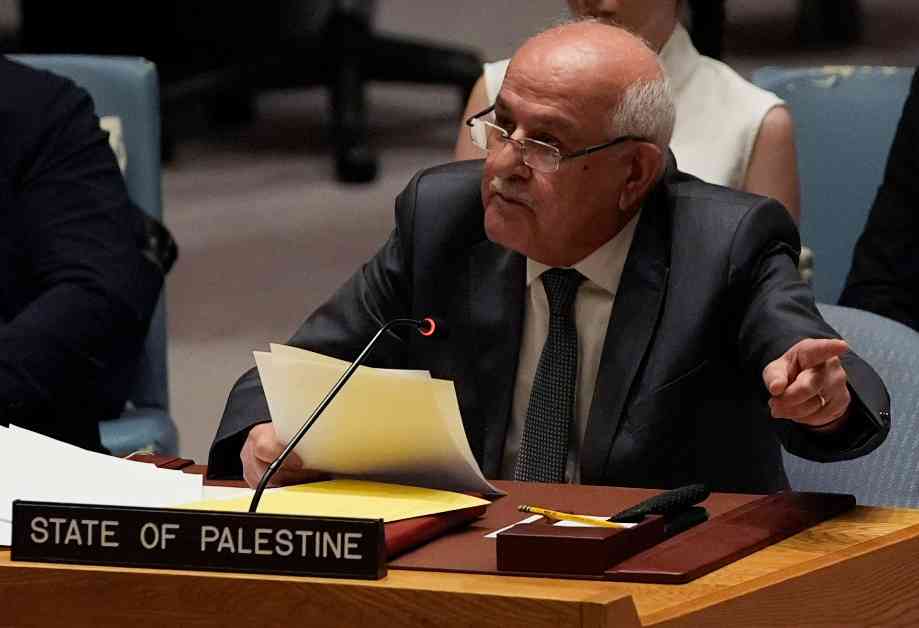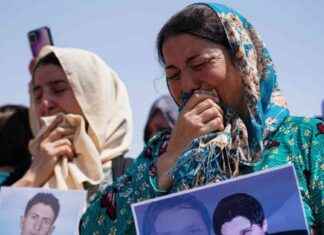Israeli-Palestinian Relations at the UN: A Clash of Perspectives
The latest session of the United Nations Security Council saw a heated exchange between the Israeli and Palestinian envoys, reflecting the ongoing tensions between the two parties. The crux of the argument revolved around Israel’s actions in Gaza, with Palestine’s envoy, Riyad Mansour, accusing Israel of disregarding UN demands. In response, Israel’s envoy asserted his country’s moral superiority. This exchange highlights the deep-rooted animosity and differing perspectives that continue to hinder progress towards peace in the region.
A History of Conflict
The Israeli-Palestinian conflict is a complex and longstanding issue that dates back decades. The root of the conflict lies in competing claims to the land of Israel/Palestine, with both sides asserting historical and religious ties to the territory. Over the years, the conflict has been marked by violence, territorial disputes, and failed peace negotiations. The international community, including the United Nations, has been involved in various efforts to mediate the conflict and promote a peaceful resolution.
The Gaza Crisis
One of the most contentious issues in the Israeli-Palestinian conflict is the situation in Gaza. The Gaza Strip, a small territory on the Mediterranean coast, has been the site of numerous conflicts and humanitarian crises over the years. The enclave is home to a large Palestinian population, many of whom live in poverty and face restricted access to basic services. The ongoing blockade by Israel has further exacerbated the humanitarian situation in Gaza, leading to widespread suffering among the civilian population.
UN Demands and Israeli Actions
At the heart of the recent clash at the UN Security Council is the issue of Israel’s actions in Gaza. The United Nations has repeatedly called on Israel to respect international law and human rights principles in its dealings with the Palestinian territories. However, Palestine’s envoy accused Israel of disregarding these demands and perpetuating the cycle of violence and suffering in Gaza. This accusation reflects the frustration and anger felt by many Palestinians over the situation in Gaza.
Israel’s Response
In response to Palestine’s accusations, Israel’s envoy asserted his country’s moral superiority. He claimed that Israel is the “most moral country in the world,” a statement that has been met with skepticism and criticism from many quarters. Israel’s actions in Gaza, including military operations and the blockade, have been widely condemned by the international community. The assertion of moral superiority by Israel’s envoy only serves to further inflame tensions and deepen the divide between the two sides.
The Role of the United Nations
The United Nations plays a crucial role in the Israeli-Palestinian conflict, serving as a forum for dialogue and negotiation between the two parties. The UN Security Council, in particular, has the authority to address issues of peace and security in the region. However, the Council’s efforts have been hampered by political divisions and competing interests among its members. The recent clash between the Israeli and Palestinian envoys is a stark reminder of the challenges facing the international community in resolving the conflict.
Moving Forward
Despite the deep-rooted animosity and differing perspectives between Israel and Palestine, there is still hope for a peaceful resolution to the conflict. The international community, including the United Nations, must continue to push for dialogue and negotiation between the two parties. Efforts to address the root causes of the conflict, including issues of land, refugees, and security, must be a priority. Only through genuine and meaningful dialogue can the Israeli-Palestinian conflict be resolved and a lasting peace achieved.
International Response and Mediation Efforts
The Israeli-Palestinian conflict has garnered significant attention and concern from the international community. Various countries and organizations have been involved in efforts to mediate the conflict and promote a peaceful resolution. The United States, the European Union, and Arab states have all played a role in facilitating negotiations between Israel and Palestine. However, these efforts have often been stymied by political divisions and competing interests among the parties involved.
Humanitarian Crisis in Gaza
The situation in Gaza continues to deteriorate, with the civilian population bearing the brunt of the conflict. The blockade by Israel has severely restricted access to basic goods and services, leading to widespread poverty and suffering among Gaza’s residents. The lack of adequate healthcare, education, and employment opportunities has exacerbated the humanitarian crisis in the enclave. International aid organizations have called for urgent action to address the plight of the people in Gaza and alleviate their suffering.
Building Trust and Reconciliation
One of the key challenges in resolving the Israeli-Palestinian conflict is the lack of trust and mutual understanding between the two parties. Years of violence and animosity have deepened the divide and made it difficult to find common ground for dialogue. Building trust and promoting reconciliation between Israelis and Palestinians is essential for achieving a lasting peace settlement. Both sides must be willing to take concrete steps towards understanding and compromise in order to move forward towards a peaceful coexistence.
Conclusion
The clash between the Israeli and Palestinian envoys at the United Nations Security Council is a stark reminder of the deep-rooted tensions and differing perspectives that continue to hinder progress towards peace in the region. The international community, including the United Nations, must redouble its efforts to promote dialogue and negotiation between the two parties. Only through genuine and meaningful engagement can the Israeli-Palestinian conflict be resolved and a lasting peace achieved.



























